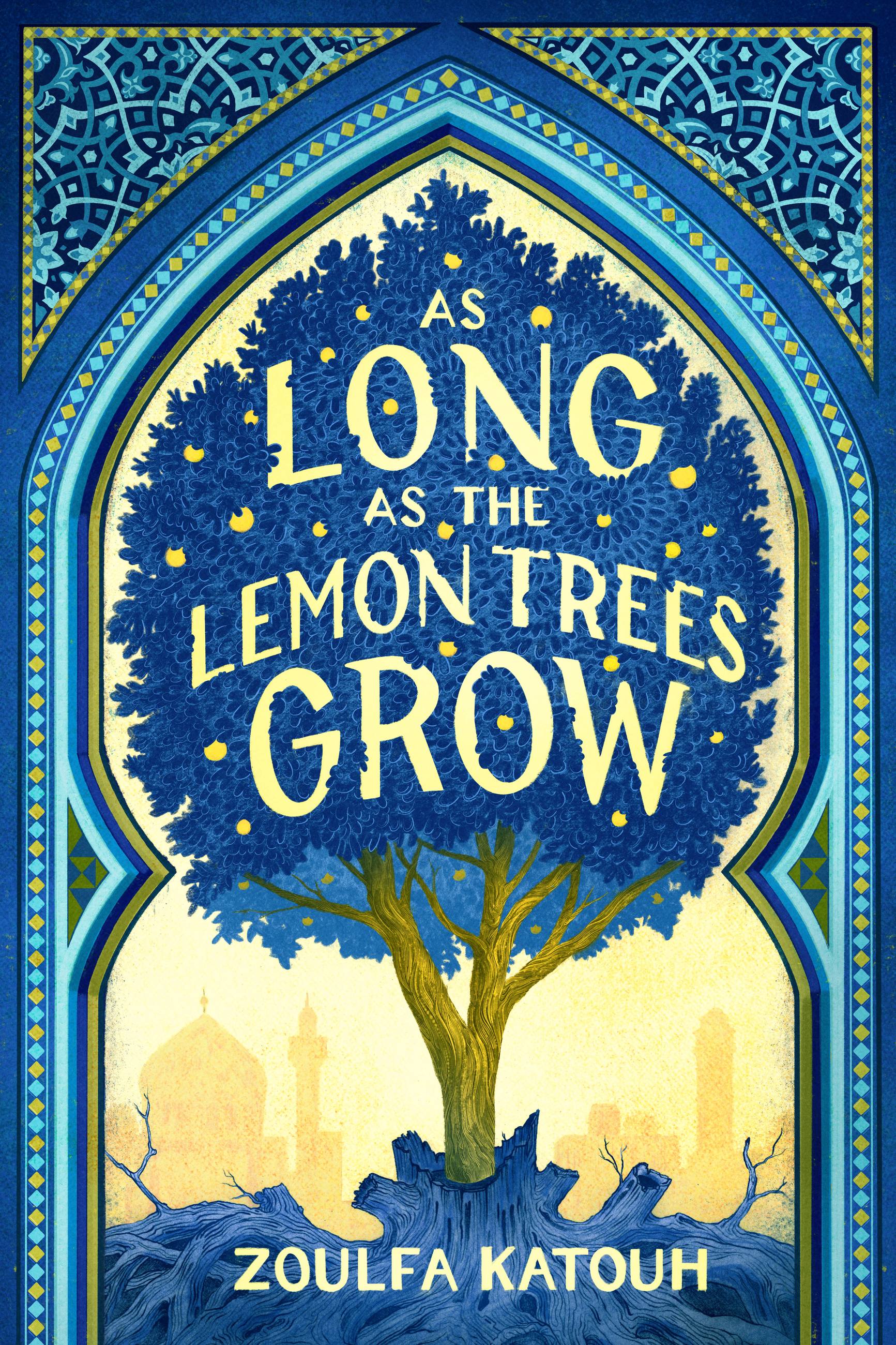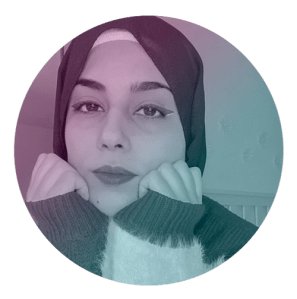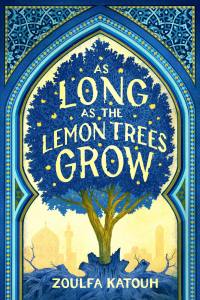Cover Reveal: As Long As the Lemon Trees Grow by Zoulfa Katouh
Have you ever had a book immediately grip you by the throat and refuse to let go? One of those books that catches your breath and holds it until the very final page? A book that lingers with you at the back of your mind for months and years after you have read it? As Long As the Lemon Trees Grow is one of those books. Gripping, heartbreaking, transcendent… Seriously, if you need to get your hands on this book and read it! Unfortunately, I can’t give you the full book right now, but I can give you a sneak peek alongside a look at it’s glorious cover! So feast your eyes and prepare your hearts for an absolutely unparalleled experience!

Salama Kassab was a pharmacy student when the cries for freedom broke out in Syria. She still had her parents and her big brother; she still had her home. She had a normal teenager’s life.
Now Salama volunteers at a hospital in Homs, helping the wounded who flood through the doors daily. Secretly, though, she is desperate to find a way out of her beloved country before her sister-in-law, Layla, gives birth. So desperate, that she has manifested a physical embodiment of her fear in the form of her imagined companion, Khawf, who haunts her every move in an effort to keep her safe.
But even with Khawf pressing her to leave, Salama is torn between her loyalty to her country and her conviction to survive. Salama must contend with bullets and bombs, military assaults, and her shifting sense of morality before she might finally breathe free. And when she crosses paths with the boy she was supposed to meet one fateful day, she starts to doubt her resolve in leaving home at all.
Soon, Salama must learn to see the events around her for what they truly are—not a war, but a revolution—and decide how she, too, will cry for Syria’s freedom.
Sneak Peek
The sound of Layla sighing snaps me out of my daydream.
“Life is more than just survival, Salama,” she says.
“I know that,” I reply. Our teasing mood has vanished.
She gives me a pointed look. “Do you really? Because I see the way you act. You’re just focusing on the hospital, on working, on me. But you’re not actually living. You’re not thinking about why this revolution is happening. It’s as if you don’t want to think about it at all.” She pauses, holding my stare, and my mouth dries. “It’s as if you don’t care, Salama. But I know you do. You know this revolution is about getting our lives back. It’s not about survival. It’s about us fighting. If you can’t fight here, you won’t anywhere else. Not even if you changed your mind and we made it to Germany.”
I stand and gesture at the forlorn, peeling paint on the walls. At nothing. “Fight what? We’ll be lucky if the worst that happens to us here is death, and you know that. Either we’ll get arrested by the military or a bomb will kill us. There’s nothing to fight for because we can’t fight. No one’s helping us! I volunteer at the hospital because I can’t stand seeing people die. But that’s it.”
Layla looks at me but there’s no annoyance in her eyes. Only compassion. “We fight while we’re still here, Salama, because this is our country. This is the land of your father, and his father before him. Your history is embedded in this soil. No country in the world will love you as yours does.”
Tears sting my eyes. Her words echo from the history books we read at school. Love for our country is in our bone marrow. It’s in our national anthem, which we sang every morning from our first day in school. The words were just words then. But now, after all of this, they have become our reality.
Our spirits are defiant, and our history is glorious.
And our martyrs’ souls are formidable guardians.
I avoid Layla’s gaze. I don’t want a guilt trip. I’ve had enough of that already.
“I’ve lost enough in this war,” I say bitterly.
Her voice is firm. “It’s not a war, Salama. It’s a revolution.”
“Whatever.”
And with that, I walk back to my bedroom, closing the door behind me so I can breathe. All I care about—all I have left in the world—is Layla and the hospital. I’m not a monster. There are people suffering and I can help. It’s the reason I wanted to be a pharmacist. But I refuse to think about why they end up in the hospital. Why all of this is happening. The why took away Mama. I remember her fingers, cold against mine. It took Baba and Hamza to God knows where. I don’t want to dwell on the past. I don’t want to cry about how I’m going to end my teen years with nothing more than lost hope and nightmare-filled sleep. I want to survive.
I want my family. I just want my family back.
Even if what Layla said is the truth.
I change into the only pajamas I have left. A black cotton sweater and pants. Decent enough if I ever need to make an escape into the night. In the bathroom, I ignore my wasted reflection and dry brown hair falling past my shoulders and open the water tap out of habit. Nothing. The neighborhood hasn’t had water or electricity in weeks. It used to come in bursts but has stopped altogether with the siege. Luckily it rained last week, so Layla and I put out buckets to collect the water. I use a small handful for ablution and pray.
The sun’s feeble rays have vanished from my room’s scratched floorboards, and the dark cloak of the night takes over Homs. My teeth chatter for a bit with anticipation before I clamp my lips shut, swallowing thickly. Whatever control I exude during the day falters when the sun sets.
I sit on my bed, close my eyes, and take deep breaths. I need to clear my mind. I need to focus on something other than the fear and pain that have taken root in my soul.
“Sweet alyssum. Sweet as their name,” I murmur, praying for my nerves not to fail me. “White petals. Used for pain relief. Also for colds, abdominal cramps, and coughs. Sweet. Sweet.”
It works. My lungs begin distributing the oxygen evenly to my blood. I open my eyes and watch the thicket of gray clouds outside my window. The glass is chipped at the sides from when Layla’s home took the impact of a nearby bomb, and the frame is splintered. When I moved in, I had to wash blood from the pane.
Despite the window being locked, a chill sweeps the room, and I shiver, knowing what’s about to happen. The horror I see isn’t just confined to the hospital. It has mutated in my mind, bestowing the terror I feel with a life and a voice that never fail to show up each night.
“How long are you going to sit there without talking to me?” The deep voice comes from beside the windowsill, sending gooseflesh all over my neck.
His voice reminds me of the freezing water I splash over myself when I come home drenched in the martyrs’ blood. It’s stones weighing on my chest, sinking me to the earth below. It’s heavy as a humid day and deafening as the bombs the military throws on us. It’s what our hospital is built on, and the wordless sounds we make.
I turn toward him slowly. “What do you want now?”
Khawf looks at me. His suit is crisp and clean. It troubles me, though, the specks of red lining his shoulders. They’ve been there since we met, and I still haven’t gotten used to them. But I don’t like looking at his eyes either—icy blue. With his midnight-black hair, he doesn’t look human, which I suppose is the point. He looks as close to human as he can try to be.
“You know what I want,” his voice ripples, and I shiver.
 About the Author
About the Author
Zoulfa Katouh is a Syrian Canadian living in Switzerland. She is currently doing her master’s in Drug Sciences and finds Studio Ghibli inspiration in the mountains, lakes, and stars surrounding her. In her books, you will find strong girls, soft boys, magic, and characters who look like her that grab life by the lapels and live it to the fullest. When she’s not talking to herself in the woodland forest, she’s drinking iced coffee, baking aesthetic cookies and cakes, and telling everyone who would listen about how BTS paved the way. Her dream is to get Kim Namjoon to read one of her books. If that happens, she will expire on the spot. As Long As the Lemon Trees Grow is her debut novel. You can find her on Twitter @thelemonwitch_ or on her website zoulfakatouh.com.






